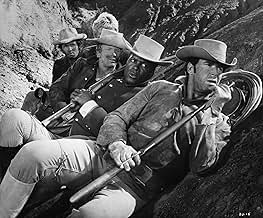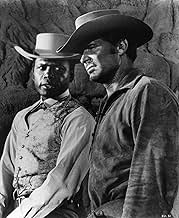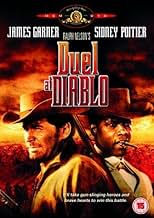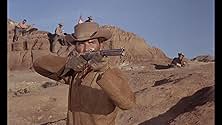In Apache territory, a supply Army column heads for the next fort, an ex-scout searches for the killer of his Indian wife, and a housewife abandons her husband in order to rejoin her Apache ... Read allIn Apache territory, a supply Army column heads for the next fort, an ex-scout searches for the killer of his Indian wife, and a housewife abandons her husband in order to rejoin her Apache lover's tribe.In Apache territory, a supply Army column heads for the next fort, an ex-scout searches for the killer of his Indian wife, and a housewife abandons her husband in order to rejoin her Apache lover's tribe.
- Awards
- 1 nomination total
- Col. Foster
- (as Alf Elson)
- Ramirez
- (uncredited)
- Trooper Nyles
- (uncredited)
- Deputy Clem
- (uncredited)
- Trooper Casey
- (uncredited)
- Norton
- (uncredited)
- Trooper Swenson - Bugler
- (uncredited)
Featured reviews
For one thing, there's about ten sub-plots too many. Heck, just the ordeal across the desert should be enough for most westerns without over-crowding the storyline. Sure, the script is making a good point about racism with Ellen's half-Indian baby. But do we need the soap opera sub-plot with husband Dennis Weaver that's mainly a distraction. Then there's Poitier showing it wasn't just white guys who won the west. And, of course, the screenplay has to carve out a large enough role for a second headliner. Add to that Garner's search for whoever scalped his wife that is sort of tacked on at the end, and we've got enough plot material for three more features.
Sure, the movie's heart is in the right place. But messages are one thing, while merging them into a fluid narrative is another, and here the sub-plots add to the general problem of too much storyline clutter. The root of the problem, I expect, was hiring too many name stars, even if Travers and Andersson are known mainly to foreign audiences. Speaking of the cast, Garner's unusual skills are largely wasted in a role any number of imposing presences like Clint Walker could have easily handled.
And I never thought it would happen, but by about the twentieth skirmish across the desert, I actually got a little bored with all the repetitive stunts and endless shooting. 'More', it seems, is not always better, and I suspect the lesson is there can be too much action even in an action movie.
Anyway, I don't want to simply dismiss the movie because of its excesses since there are also a number of good touches (Chata gets some respect as a leader of his people, even though we see him as cruel), along with the generous production values. I'm just sorry the movie doesn't succeed better given its praiseworthy side.
Bill Travers doesn't have to do an American accent.
this was from a time that people believed that there could be major characters with foreign accents in the USA who weren't villains.
Of course the USA at this time, and at any time, had plenty of odd accents. Except in movies.
The credits are waaaay more imaginative that you'd normally expect.
The music is highly "different" The camera-work is very strange- all those overhead shots.
I love this movie, and is a film I can watch again and again. It's very stylised-the lines are delivered like they were from a comic book.
You know-the sort of thing Quentin T "discovered"
A competently well-made and satisfying western that's highlighted by the prominent cast and exhilaratingly taut and unsparing action sequences. Ralph Nelson smoothly paces this drum-beating foray, with its adeptly bold and old-fashioned direction. His professional touch lifts the screenplay. Going a long way to giving it a real bravado feel amongst the gritty, dusty and sprawling rocky terrain, which is masterfully framed with a lot of ticker and claustrophobic channelling by cinematography Charles F. Wheeler. The main feature of the film that strikes a chord, has got to be composer Neal Hefti's effectively novel, melodic score that seems to match and illustrate the sequences and overall feel rather well, despite the uncanny tone for this type of film. I found the dynamic cues to be rather contagious. Albert and Michael M. Grilikhes' open screenplay (which is based on the Marvin Albert's novel, "Apache Rising") is pretty much to the point and a little lacking by simply going through the motions. But even with those vague moments, it still thrives on well-rounded dialogues from its sturdy script. In there are configurations of racism, and the unfair treatment of the Indians, but it's the personal confrontations and torment that makes for one gruelling exercise. It never lets any of this get carried away, but the starkly harsh nature stays throughout. The performances are richly devised, to stew up depth and realism due more to their favourable acting than in the way of the material. James Garner's winningly focused performance as rugged, seldom Jess is first-rate. Sidney Poitier classy turn as Toller is a different stroke and admirably good one. Bill Travers' growing performance is very strong and humane. Dennis Weaver eclectically solid. Bibi Andersson was mildly okay, but was hindered and the modest John Hoyt didn't see enough time as Chata.
Dated, but a well handled, compelling and tough as nails western, which finally shines through.
As in any good western, the scenery also plays an important part and the southern Utah settings are particularly striking. The musical soundtrack is a little off-beat for a western, but also very good. Dennis Weaver, Sidney Poitier, and Bill Travers all add to the movie with good supporting performances.
Storyline
Did you know
- TriviaJames Garner's first western since leaving Maverick (1957) and Sidney Poitier's first theatrical western.
- GoofsAs Willard hands his wife a gun, he says there are two cartridges in gun. However, it can be seen that all six chambers are loaded.
Bullet noses can be seen in the chambers on the left side of the cylinder but a minute or so later, the right side is on camera and shows 3 empty chambers.
- Quotes
Ellen Grange: They all think that any decent woman would prefer to die than live as an Apache squaw. Maybe they're right.
Jess Remsberg: Death comes soon enough. Anyone who hurries it is a damn fool.
- Crazy creditsThe United Artists logo is sliced off the screen with a bloody Calvary Saber, slicing an "X" across the screen, revealing the opening scene. At the end, the same saber slices the live picture away, as (sort of) a fade out.
- ConnectionsFeatured in Across 110th Street (1972)
- How long is Duel at Diablo?Powered by Alexa
Details
- Runtime1 hour 43 minutes
- Color
- Aspect ratio
- 1.66 : 1
Contribute to this page






































